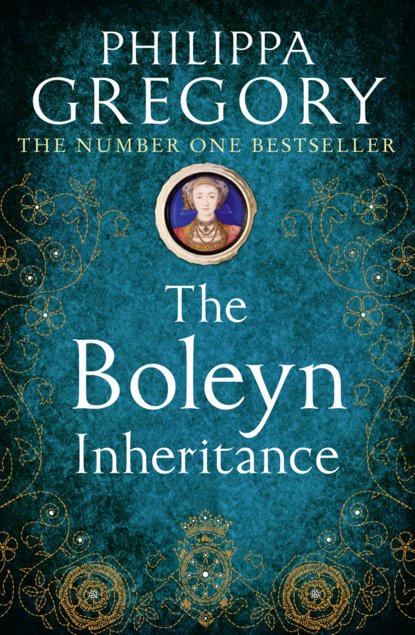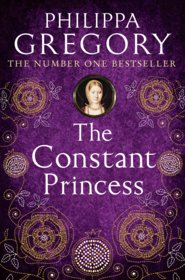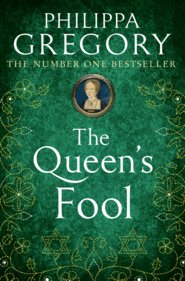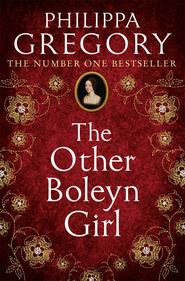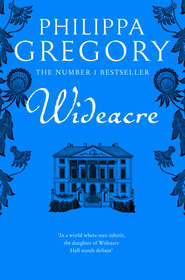По всем вопросам обращайтесь на: info@litportal.ru
(©) 2003-2025.
✖
The Boleyn Inheritance
Автор
Год написания книги
2019
Настройки чтения
Размер шрифта
Высота строк
Поля
Anne, Blackheath, 3 January 1540 (#ulink_4439b3ce-7362-554b-b601-81ec2388d639)
This is the happiest day of my life, because today I have fallen in love. I have fallen in love, not like a silly girl falls in love, because a boy catches her eye or tells her some foolish story. I am in love and this love will last forever. I am in love with England this day, and the realisation has made this the happiest day of my life. This day I realise that I am to be queen of this country, this rich, beautiful country. I have been travelling through it like a fool, with my eyes shut – in all fairness, some of the time I have been travelling through it in darkness and in the worst weather that I could imagine – but today it is bright and sunny and the sky is so blue, blue as duck eggs, the air is fresh and bright, as exciting and cold as white wine. Today I feel like the gyrfalcon my father used to call me, I feel as if I am riding high on cool winds, looking down on this most beautiful country which will be mine. We ride from Dartford to Blackheath, the frost white and shining on the road all the way, and when we get to the park all the ladies of my court are presented to me, all dressed so beautifully and warm and friendly in their greetings. I am to have nearly seventy ladies altogether, the king’s nieces and cousins among them, and they all greet me today as new friends. I am wearing my very best, and I know I look well, I think even my brother would be proud of me today.
They have made a city of tents of cloth of gold, flying brilliantly coloured flags, guarded by the king’s own Yeomen of the Guard, men so tall and so handsome that they are a legend in England. While we wait for the king, we go inside and take a glass of wine and warm ourselves at the braziers, they are burning sea-coal for me, only the best, as I am to be a member of the royal family of England. The floors are lined with rich carpets and the tents hung with tapestries and silks for warmth. Then, when they say it is time, and everyone is smiling and chattering and almost as excited as I am, I mount my horse and ride out to meet him. I go out filled with hope. Perhaps, at this ceremonial meeting, I shall like him and he will like me.
The trees are tall and their bare black winter branches stretch out against the sky like dark threads on a tapestry of blue. The park extends for miles, so green and so fresh, sparking with melting frost, the sun is bright and pale yellow, almost burning white in the sky. Everywhere, held back by gaily coloured ropes, there are the people from London smiling and waving at me and calling blessings down on me, and for the first time in my life I am not Anne – the middle daughter of Cleves: less pretty than Sybilla, less charming than Amelia – but here I am Anne, the only Anne. They have taken me to their hearts. These odd, rich, charming, eccentric people are all welcoming me, as if they want a good queen and an honest queen, and they believe and I know that I can be such a queen for them.
I know very well that I am not an English girl like the late Queen Jane, God rest her soul. But having seen the court and the great families of England I think it might be a good thing that I am not an English girl. Even I can see that the Seymour family is high in favour now, and could easily become overmighty. They are everywhere, these Seymours, handsome and conceited, always emphasising their child is the king’s only son and heir to the throne. If I were the king and it were my court, I should be wary of them. If they are allowed to govern the young prince, to dominate him because of their kinship to his mother, then the balance of this court will all be thrown to them. From what I can see, the king is not careful who he chooses for his favourites. I may be half his age but I know well enough that a ruler’s favour must be measured. I have lived my life with the disfavour of the favourite son and I know how poisonous is whim in a ruler. This king is whimsical; but perhaps I can make his court more balanced, perhaps I can give his son a level-headed stepmother who can maintain the flatterers and the courtiers at a safe distance from the little boy.
I know his daughters have been estranged from him. Poor girls, I so hope to be of service to little Elizabeth, who never knew her mother and has spent her life under the shadow of disgrace. Perhaps I can bring her to court and keep her near me and reconcile her to her father. And the Princess Mary must be lonely, without her mother and knowing herself to be far from her father’s favour. I can be kind to her, I can overcome her fear of the king and bring her to court as my kinswoman, she need not say ‘stepmother’, but perhaps I could be as a good sister to her. For the king’s children at least I can be a great force for good. And if we are blessed, if I am blessed, and we have a child of our own then perhaps I shall give a little prince to England, a godly youth who can help to heal the divisions in this country.
There is a murmur of excitement from the crowd and I see all the heads turn away from me and back again. The king is coming towards us, and all my fears about him are gone in a moment. Now he is not pretending to be a common man, he is not hiding majesty in the disguise of a vulgar old fool, today he is dressed as a king and he rides as a king, in a coat embroidered with diamonds, with a collar of diamonds around his shoulders, on his head a hat of velvet sewn with pearls, and on the finest horse I think I have ever seen. He is magnificent, he looks like a god in the bright winter light, his horse curvetting on his own land, weighed down with jewels, surrounded by the royal guard with the trumpets singing out. He smiles when he draws near to me and we greet each other, and people cheer to see us together.
‘I give you welcome to England,’ he says slowly enough for me to understand, and I reply carefully in English: ‘My lord, I am very glad to be here, and I shall try to be a good wife to you.’
I think I will be happy, I think it can be done. That first embarrassing mistake can be forgotten and put behind us. We will be married for years, we will be happy together for all our lives. In ten years from now, who will ever remember a little thing like that?
Then my chariot comes and I ride through the park to the palace of Greenwich, which is by the river, and all the barges on the river are dressed out in colours with flags flying and the London citizens are dressed in their very best. They have musicians out on the water and they are playing a new song called ‘Merry Anna’, written for me, and there are pageants on the boats to celebrate my coming, and everyone is smiling and waving at me; so I smile and wave back.
Our procession turns up the sweeping approach to Greenwich and I realise again what a country it is, this new home of mine. For this Greenwich is not a castle at all, not fortified in fear against an enemy who might come, it is a palace built for a country at peace, a great, rich, fair palace, as fine as anything in France. It faces the river and is the most beautiful building of stone and precious Venice glass that I have ever seen in my life. The king sees my delighted face and brings his horse alongside my chariot and leans down to tell me that this is just one of his many palaces, but his favourite, and that in time, as we travel around the country, I shall see the others, and that he hopes I shall be happy with them all.
They take me to the queen’s rooms to rest, and for once I do not want to hide in the private rooms, but instead I am glad to be here, with my ladies around me in my privy chamber, and more of them waiting in the great presence chamber outside. I go into the private robing room and change into my taffeta gown, which they have trimmed with the sables that the king gave me for the New Year. I think I have never had such a fortune on my back in my life before. I lead my ladies down to dinner feeling as if I am queen already and at the entrance to the great dining hall the king takes me by the hand and leads me around the tables, where everyone bows and curtseys and we smile and nod, hand-clasped, like husband and wife already.
I am starting to recognise people, and to know their names without prompting, so now the court is not such a friendless blur. I see Lord Southampton, who looks tired and troubled, as well he might be for the work he has done for me in bringing me here. His smile is strained and, oddly, his greeting is cool. He glances away from the king as if there is some trouble brewing, and I remember my resolution to be a fair queen in this court that is commanded by whim. Perhaps I will learn what is troubling Lord Southampton, perhaps I can help him.
The king’s foremost advisor, Thomas Cromwell, bows to me and I recognise him from my mother’s description as the man, more than any other, who sought alliance with us and with the Protestant dukes of Germany. I would have expected him to greet me more warmly, since my marriage is the triumph of his planning, but he is quiet and self-effacing and the king leads me past him with only a short word.
Archbishop Cranmer is dining with us as well, and I recognise Lord Lisle and his wife. He too is looking weary and guarded, and I remember his fears in Calais of the divisions in the kingdom. I smile warmly at him. I know that there is work for me to do in this country. If I can save one heretic from the fires then I will have been a good queen and I am sure I can use my influence to bring this country to peace.
I am starting to feel that I have friends in England, and when I look down the hall and see my ladies, Jane Boleyn, kind Lady Browne, the king’s niece Lady Margaret Douglas and little Katherine Howard among them, I start to feel that this indeed can be my new home, and that the king is indeed my husband, his friends and his children shall be my family, and that I shall be happy here.
Katherine, Greenwich Palace, 3 January 1540 (#ulink_4db39550-e7cc-5abb-85d5-3dfa4117f503)
Just as I have always dreamed, there is to be dancing after dinner in a beautiful chamber filled with the most handsome young men in the world. And better than my greatest dreams I have a new gown and pinned to the gown, as obviously, as noticeable as possible, is my new gold brooch given to me by the King of England himself. I finger it all the time, almost as if I were pointing at it and saying to people: ‘What d’you think of that then? Not bad for practically my very first day at court.’ The king is on his throne looking powerful and fatherly, and Lady Anne is as pretty as she can be (given that awful dress) beside him. She might as well have just thrown the sables in the Thames as have them sewn on that taffeta tent. I am so distressed about such wonderful furs all but thrown away that it almost dims my pleasure for a moment.
But then I glance around the room – not in an immodest way, just glancing around as if looking for nothing in particular – and I see first one young, handsome boy and then another, half a dozen indeed that I would be glad to know better. Some of them are sitting together at a table, it is the pages’ table, and every single one of them is a son of a good family, wealthy in their own right, and high in the favour of a lord. Dereham, poor Dereham, would be a nobody to them, Henry Manox would be their servant. These will be my new suitors. I can barely drag my eyes away from any one of them.
I catch a glance or two in my direction and know that prickle of excitement and pleasure that tells me that I am being watched, that I am desired, that my name will be mentioned, that a note will be passed to me, that the whole joyous adventure of flirtation and seduction will start again. A boy will ask my name, will send a message. I will agree to a meeting, there will be an exchange of looks and silly words over dancing and sports and dinner. There will be a kiss, there will be another, then slowly, deliciously, there will be a seduction and I shall know another touch, another boy’s delicious kisses, and I shall fall head over heels in love again.
The dinner is delicious but I pick at my food because at court there is always someone watching you, and I don’t want to seem greedy. Our table faces the front of the hall so it is natural that I look up to see the king at his dinner. In his rich clothes and great collar of gold you might mistake him for one of the old pictures over an altar; I mean, a picture of God. He is so grand and so broad and so weighted with gold and jewels, he sparkles like an old treasure mountain. There is a cloth of gold spread over his great chair, with embroidered curtains hanging down on either side, and every dish is served to him by a servant on his knees. Even the server who offers him a golden bowl to dip his fingers and wipe his hands does so on bended knee. There is another server altogether to hand him the linen cloth. They bow their heads as well when they kneel to him, as if he were of such unearthly importance that they cannot meet his eyes.
So when he looks up and sees me watching him, I don’t know whether I should look away, or curtsey, or what. I am so confused by this that I give him a little smile and half look away and half look back again, to see if he is still watching, and he is. Then I think that this is just what I would do if I was trying to attract a boy, and that makes me blush and look down at my plate, and I feel such a fool. Then, when I look up, under my eyelashes as it happens, to see if he is still looking at me, he is gazing away down the hall and clearly has hardly noticed me at all.
My uncle Howard’s sharp black gaze is on me though, and I am afraid he will frown; perhaps I should have curtseyed to the king when I first caught his eye. But the duke just gives a little approving nod and speaks to a man seated on his right. A man of no interest to me, he must be a hundred and ninety-two if he is a day.
I really am amazed at how old this court is, and the king is quite ancient. I always had the impression of it being a court of young people, young and beautiful and joyful; not such very old men. I swear that there cannot be a friend of the king’s who is a day under forty years. His great friend Charles Brandon, who is said to be a hero of glamour and charm, is absolutely ancient, in his dotage at fifty. My lady grandmother talks about the king as if he was the prince that she knew when she was a girl, and of course this is why I have it all wrong. She is such an old lady that she forgets that long years have gone by. She probably thinks that they are all still young together. When she talks about the queen she always means Queen Katherine of Aragon, not Queen Jane or even the Lady Anne Boleyn. She just skips every queen since Katherine. Indeed, my grandmother was so frightened by the fall of her niece Anne Boleyn that she never speaks of her at all except as a terrible warning to naughty girls like me.
It wasn’t always like that. I can just about remember first coming to my step-grandmama’s house at Horsham and every second sentence was ‘my niece the queen’ and every letter to London asked her for a favour or a fee, a place for a servant, or the pickings of a monastery, asked her to turn out a priest or pull down a nunnery. Then Anne had a girl and there was a good deal of ‘our baby the Princess Elizabeth’ and hopes that the next baby would be a boy. Everyone promised me I would have a place at court in my cousin’s household, I would be kin to the Queen of England, who knew where I might look for a husband? Another Howard cousin, Mary, was married to the king’s bastard son Henry Fitzroy, and a cousin was intended for Princess Mary. We were so inter-married with the Tudors that we would be royal ourselves. But then slowly, like winter coming when you don’t at first notice the chill, there was less spoken of her, and less certainty about her court. Then one day my step-grandmother called the whole household into the great hall and said abruptly that Anne Boleyn (she called her that, no title, definitely no kinship), Anne Boleyn had disgraced herself and her family and betrayed her king and that her name and her brother’s name would never again be mentioned.
Of course we were all desperate to know what had happened but we had to wait for servants’ gossip. Only when the news finally came from London could I learn what my cousin Queen Anne had done. My maid told me, I can hear her now telling me, that Lady Anne was accused of terrible crimes, adultery with many men, her brother among them, witchcraft, treason, bewitching the king, a string of horrors from which only one thing stood out to me, an aghast little girl: that her accuser was her uncle, my uncle Norfolk. That he presided over the court, that he pronounced her death sentence and that his son, my handsome cousin, went to the Tower like a man might go to a fair, dressed in his best, to see his cousin beheaded.
I thought my uncle must be a man so fearsome that he might have been in league with the devil; but I can laugh at those childish fears, now that I am his favourite, so high in his favour that he has ordered Jane Boleyn, Lady Rochford, to take most particular care of me, and given her money to buy me a gown. Obviously, he has taken a great fancy to me, he likes me best of all the Howard girls he has placed at court, and thinks that I will advance the interests of the family by making a noble match or becoming friends with the queen, or charming to the king. I had thought him a man of fiendish heartlessness but now I find him a kindly uncle to me.
There is a masque after dinner and some very funny clowning from the king’s fool, and then there is some singing that is almost unbearably dull. The king is a great musician, I learn, and so most evenings we will have to endure one of his songs. There is a great deal of tra-la-la-ing and everyone listens very intently and applauds very loudly at the end. Lady Anne I think has no more opinion of it than me, but she makes the mistake of gazing round rather vacantly, as if she were quietly wishing to be elsewhere. I see the king glance at her, and then away, as if he is irritated by her inattention. I take the precaution of clasping my hands beneath my chin and smiling with my eyes half-closed as if I can hardly bear the joy of it. Such luck! He happens to glance my way again and clearly thinks his music has transported me. He gives me a broad, approving smile and I smile back and drop my eyes to the board as if fearful of looking at him for too long.
‘Very well done,’ says Lady Rochford, and I give her a little beam of triumph. I love, I love, I love court life. I swear it will quite turn my head.
Jane Boleyn, Greenwich Palace, 3 January 1540 (#ulink_3a737565-4c55-5795-b074-c6fe0420264a)
‘My lord duke,’ I say, bowing very low.
We are in the Howard apartments at Greenwich Palace, a series of beautiful rooms opening the one into another, almost as spacious and beautiful as the queen’s own rooms. I stayed here once with George, when we were newly wed, and I remember the view over the river, and the light at dawn when I woke, so much in love, and I heard the sound of swans flying overhead going down to the river on their huge creaking wings.
‘Ah, Lady Rochford,’ says my lord duke, his lined face amiable. ‘I have need of you.’
I wait.
‘You are friendly with the Lady Anne, you are on good terms?’
‘As far as I can be,’ I say cautiously. ‘She speaks little English as yet but I have made a great effort to talk to her and I think she likes me.’
‘Would she confide in you?’
‘She would speak to her Cleves companions first, I think. But she sometimes asks me things about England. She trusts me, I think.’
He turns to the window and taps his thumbnail against his yellow teeth. His sallow face is creased in thought.
‘There is a difficulty,’ he says slowly.
I wait.
‘As you heard, they have indeed sent her without the proper documents,’ he says. ‘She was betrothed when she was a child to Francis of Lorraine, and the king needs to see that this engagement was cancelled and put aside before he goes any further.’
‘She is not free to marry?’ I demand, astounded. ‘When the contracts have been signed and she has come all this way and been greeted by the king as his bride? When the City of London has welcomed her as their new queen?’
‘It is possible,’ he says evasively.
It is absolutely impossible, but it is not my place to say so. ‘Who says that she may not be free to marry?’
‘The king fears to proceed. His conscience is uneasy.’
I pause, I cannot think fast enough to make sense of this. This is a king who married his own brother’s wife, and then put her aside because he said the lifelong marriage was invalid. This is a king who put Anne Boleyn’s head on the block as a matter of his own judgement under the exclusive guidance of God. Clearly, this is not a king who would be deterred from marrying a woman just because some German ambassador did not have the right piece of paper to hand. Then I remember the moment when she pushed him aside, and his face as he stepped back from her at Rochester.
‘It is true then. He doesn’t like her. He can’t forgive her for her treatment of him at Rochester. He will find a way to get out of the marriage. He is going to claim pre-contract again.’ One glance at the duke’s dark face tells me that I have guessed right and I could almost laugh aloud at this new twist in the play that is King Henry’s comedy. ‘He doesn’t like her and he is going to send her home.’
‘If she confessed that she was pre-contracted she could go home again, without dishonour, and the king would be free,’ the duke says quietly.
‘But she likes him,’ I say. ‘At any rate, she likes him enough. And she can’t go home again. No woman of any sense would go home again. Go back to be spoiled goods in Cleves when you could be Queen of England? She would never want that. Who would marry her if he refuses her? Who could marry her if he declares her pre-contracted? Her life would be over.’





